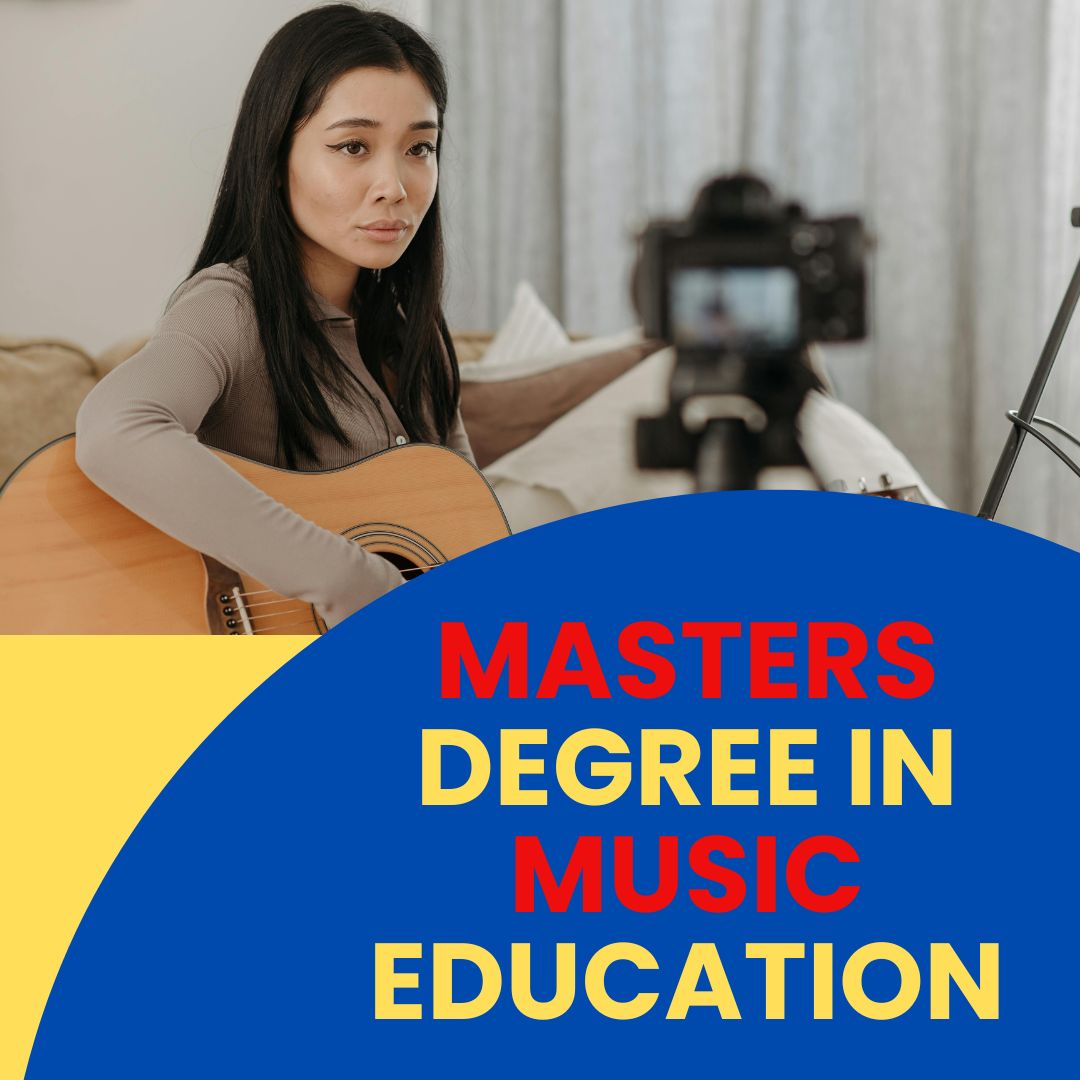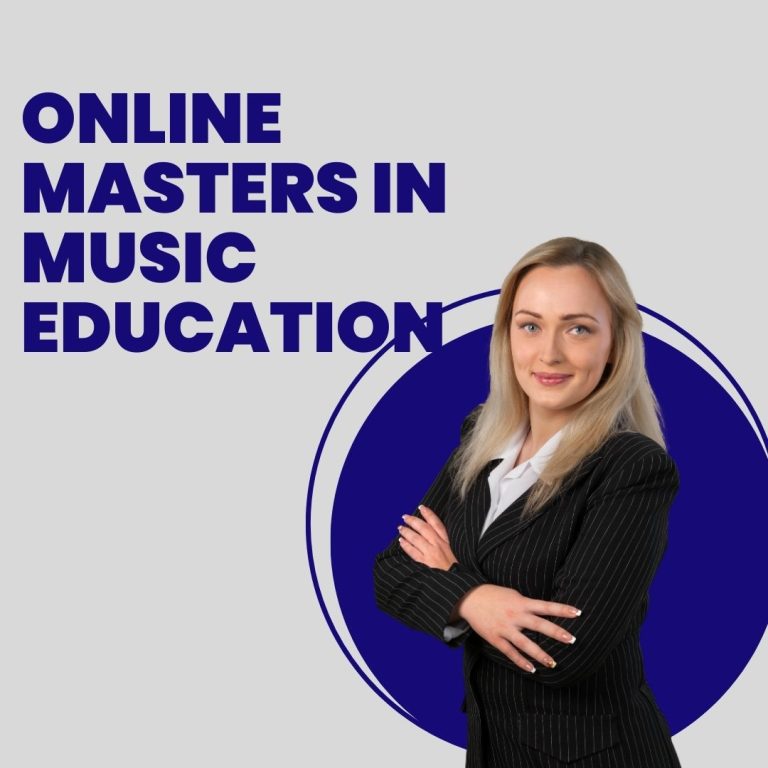Masters Degree in Music Education for Elevate Better Your Career!
A Masters Degree in Music Education equips individuals with advanced pedagogical skills for teaching music. It incorporates studies in music theory, instructional strategies, and educational research.
Pursuing a Master’s Degree in Music Education is crucial for those aiming to elevate their teaching methods and expand their understanding of music as a multifaceted subject. This program is designed for practicing music educators who wish to deepen their expertise and for musicians seeking to become adept educators in various educational settings, ranging from schools to private music programs.
Gaining a master’s in this field not only enhances your credentials but also opens doors to leadership opportunities within music education. This graduate-level degree typically merges practical performance experience with rigorous academic research, enabling graduates to refine their own musicianship while bolstering their ability to inspire others. As the demand for well-rounded music educators increases, this advanced degree serves as a valuable asset for a successful career in the field.
The Crescendo Of Careers In Music Education
The Crescendo of Careers in Music Education echoes with opportunities. A Master’s Degree in Music Education not only fine-tunes skills but also opens doors to a symphony of career options. Passionate educators find harmony in various settings, influencing the next generation of musicians and music lovers alike.
Diverse Roles For Music Educators
With a Master’s in Music Education, versatility is key. Educators step onto multiple platforms, each with its unique rhythm and audience.
- Public and private schools: Shape young minds with the power of music.
- Music conservatories: Nurture talent in specialized, high-level environments.
- Community programs: Bring music to wider audiences of all ages.
- Administrative roles: Direct and innovate behind the scenes in educational policy.
Career Trajectory For Music Degree Holders
The journey post-graduation can be as diverse as music itself. Aim high, remain resilient, and watch careers soar.
| Experience | Positions | Opportunities |
|---|---|---|
| Entry-Level | Teacher, Community Coordinator | Build experience, pursue additional certifications |
| Mid-Level | Senior Teacher, Program Director | Lead programs, mentor peers |
| Experienced | Department Head, College Professor | Drive curricular developments, publish research |
Conducting Your Research
Embarking on a Masters Degree in Music Education is a thrilling journey. To make the best decision, conducting thorough research is crucial. A strong foundation starts with selecting the right institution and considering key factors that align with personal and professional goals.
Selecting The Right Institution
Finding the perfect school for your Masters in Music Education demands attention to detail. Begin by looking at the school’s reputation in music education. Review their curriculum and specialization options. Consider the faculty’s experience and the opportunities for practical learning. Attending open houses or virtual tours can give a glimpse into campus life.
- Accreditation status – Confirm the program’s recognition by relevant educational authorities.
- Alumni network – A strong network can provide support and opportunities after graduation.
- Location – Proximity to music hubs can offer added professional advantages.
Key Considerations For Prospective Students
Prospective students should weigh various elements before making a commitment. Evaluate the program’s length and the required commitment. Look into financial considerations like tuition fees and available scholarships or assistantships. Reflect on career prospects and how the program will help you achieve your objectives.
| Consideration | Details |
|---|---|
| Program Flexibility | Check for part-time, full-time, or online learning options. |
| Course Offerings | Ensure the courses align with your interests and career goals. |
| Practical Experience | Seek programs that include internships, workshops, and performance opportunities. |
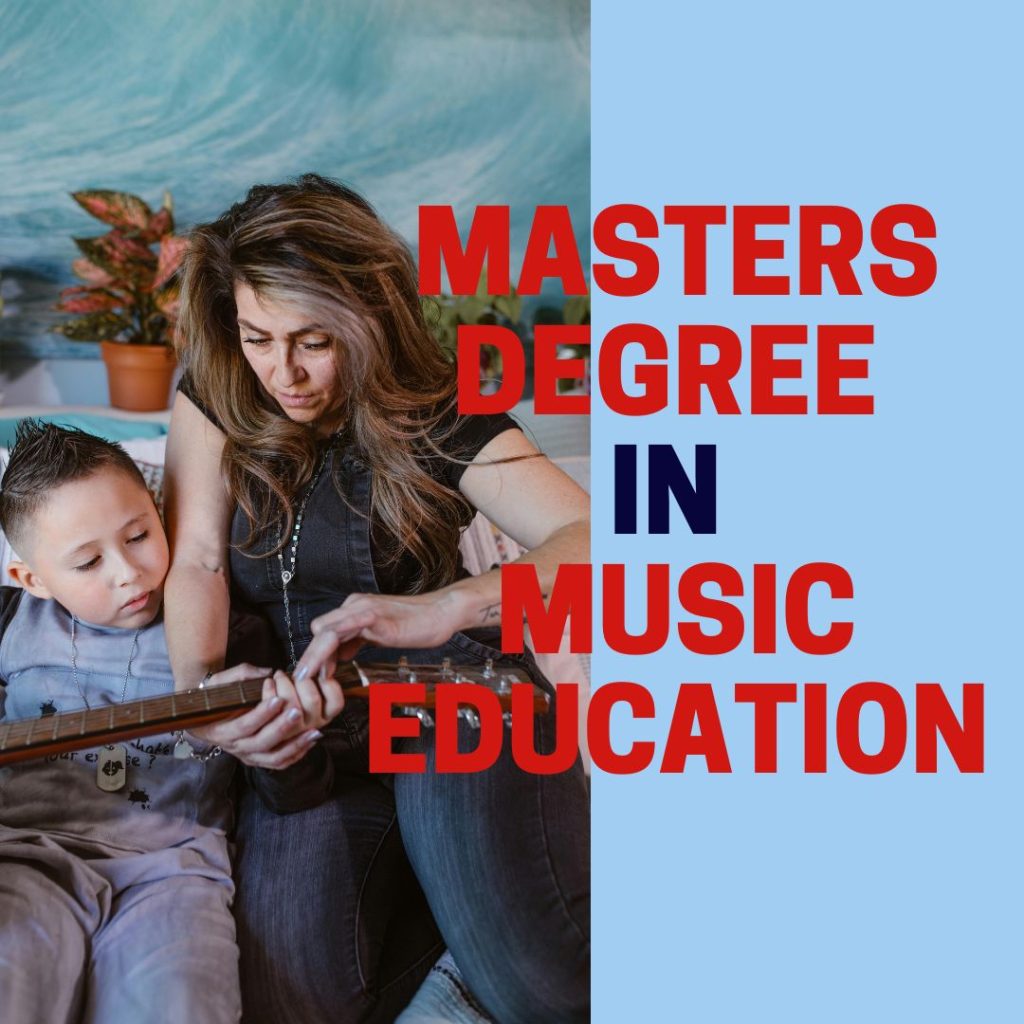
Curriculum Composition
Embarking on a Masters Degree in Music Education unlocks a symphony of skills and knowledge. The curriculum composition strikes a harmonious balance of theory, practice, and creativity. It’s tailored to transform passion into expertise for inspiring the next generation of musicians.
Core Courses In Music Education Programs
The backbone of a Music Education Master’s program lies in its core courses. These courses ensure a deep understanding of music teaching principles. They shape well-rounded educators who excel in various settings.
- Music theory and history
- Classroom management techniques
- Conducting and ensembles
- Educational psychology and pedagogy
- Curriculum development
Specialization And Elective Options
The richness of a Master’s program unfolds in specializations and electives. Students can tailor their studies to their interests. This customization breeds specialists in diverse musical fields.
| Specialization | Elective Options |
|---|---|
| Choral Conducting | Advanced Choral Techniques |
| Instrumental Music | Jazz Studies |
| Music Technology | Music Production |
| Music Therapy | Counseling for Educators |
Fine-tuning Skills And Expertise
Embarking on a Masters Degree in Music Education is more than just book learning. It means fine-tuning skills and expertise to a professional level. This degree transforms passion into prowess. It equips students with a deep understanding and advanced capabilities. Let’s explore the practical ways this transformation takes place.
Practical Experience And Internships
One key advantage of this program is the hands-on experience gained through internships. Internships provide a real-world context. Students apply theoretical knowledge in practical settings. They collaborate with experienced educators. They guide and inspire music students of all ages. This is where textbooks come to life and teaching skills sharpen.
- Classroom management: Learning effective techniques hands-on
- Lesson planning: Tailoring content to diverse learning styles
- Performance coaching: Fine-tuning student talents
Masterclasses And Workshops
Masterclasses and workshops offer unique growth opportunities. World-renowned musicians and educators lead these sessions. They focus on specific skills or concepts. Students expand their understanding. They delve into music education’s cutting-edge methods.
Topics may include:
| Masterclass Topic | Focus Area |
|---|---|
| Conducting Techniques | Enhancing leadership for musical ensembles |
| Musical Arrangement | Crafting complex scores for various formats |
| Vocal Coaching | Fine-tuning the art of voice instruction |
These interactive sessions foster immediate feedback. They encourage personal and professional development. Students hone their craft. They become adept educators, ready to inspire future generations of musicians.
The Digital Stage
Welcome to The Digital Stage, a thrilling era where pursuing a Masters Degree in Music Education transcends physical boundaries and creates endless opportunities for learning and creativity. Embrace the fusion of music and technology as we explore the digital transformation shaping today’s music education landscape.
Online Learning Platforms For Music Education
Online platforms have revolutionized how we approach music education. They offer an array of courses, interactive tools, and resources. Here are some key benefits and examples:
- Flexibility: Learn anytime, anywhere.
- Access: Diverse resources at your fingertips.
- Community: Connect with peers and experts globally.
| Platform | Features | For Whom |
|---|---|---|
| SoundBridge Academy | Interactive lessons, songwriting | Aspiring composers |
| ArtistWorks | Video exchanges, expert feedback | Instrumentalists |
| Coursera | Broad course selection, university partnerships | Music teachers |
Embracing Technology In Teaching Music
Digital tools enhance the way music educators teach. They make classes engaging, dynamic, and effective. Let’s delve into some transformative tech:
- Music Production Software: Craft high-quality music.
- Educational Apps: Interactive learning for students.
- Virtual Ensembles: Perform with others online.
Teachers who use innovative strategies stay ahead. They prepare students for a future where digital literacy is key. The digital stage welcomes all to perform and learn in new, exciting ways.
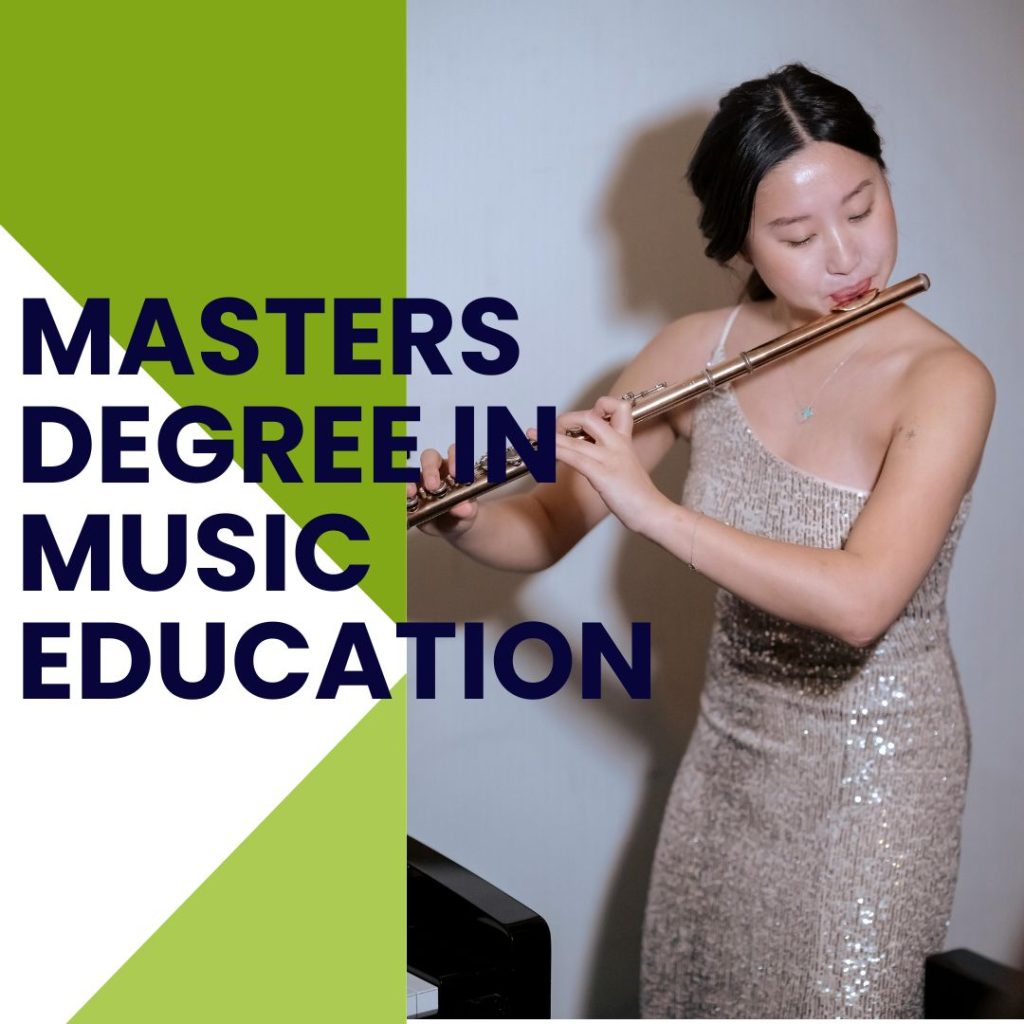
Alumni Crescendos
The ‘Alumni Crescendos’ section shines a spotlight on the high notes of a master’s journey in music education. These stories aren’t just inspiring. They are powerful melodies of achievement that keep the rhythm of success beating for current and future students.
Success Stories From Graduates
Success stories resonate like a beautiful symphony among our graduates. Each story is a unique composition that inspires.
- Jane Doe now conducts a world-renowned orchestra.
- John Smith is a music producer with Grammy-winning artists.
- Emily Johnson pioneers music therapy practices, changing lives.
These milestones reflect the quality education and dedicated mentorship received.
Networking And Alumni Resources
A strong network is key in music. Our alumni community acts as a bridge to the professional world.
| Resource | Description | Impact |
|---|---|---|
| Alumni Mixers | Events to connect with peers | Build lasting relationships |
| Job Boards | Access to exclusive vacancies | Land dream jobs in music education |
| Mentorship Programs | Guidance from established professionals | Gain industry insights and advice |
Strong connections lead to endless opportunities to compose a career that’s as unique as your music.
The Investment: Tuition And Scholarships
Understanding the financial aspects of pursuing a Master’s Degree in Music Education is crucial. Tuition costs and scholarship opportunities can greatly affect your decision. This piece delves into the investment needed for advanced music education studies and how to potentially lighten the financial load.
Costs Of Obtaining A Master’s In Music Education
Investing in a Master’s in Music Education requires a breakdown of expenses:
- Tuition fees can vary based on several factors.
- Living expenses should also be considered.
- Books and supplies might also add to the total cost.
Public institutions often charge less than private ones. Here’s a basic overview:
| Type of Institution | Average Annual Tuition |
|---|---|
| Public (In-State) | $8,000 – $20,000 |
| Public (Out-of-State) | $12,000 – $35,000 |
| Private | $15,000 – $50,000 |
Financial Aid And Scholarship Opportunities
Students have various financial aid options available:
- Federal and state grants that do not require repayment.
- Student loans that must be paid back over time.
- Work-study programs offer part-time employment.
Scholarships provide no-cost educational funding. They can come from:
- Universities offering merit or need-based awards.
- Professional music organizations supporting up-and-coming musicians.
- Private foundations with specific eligibility criteria.
To uncover scholarship opportunities, research and diligence are essential.
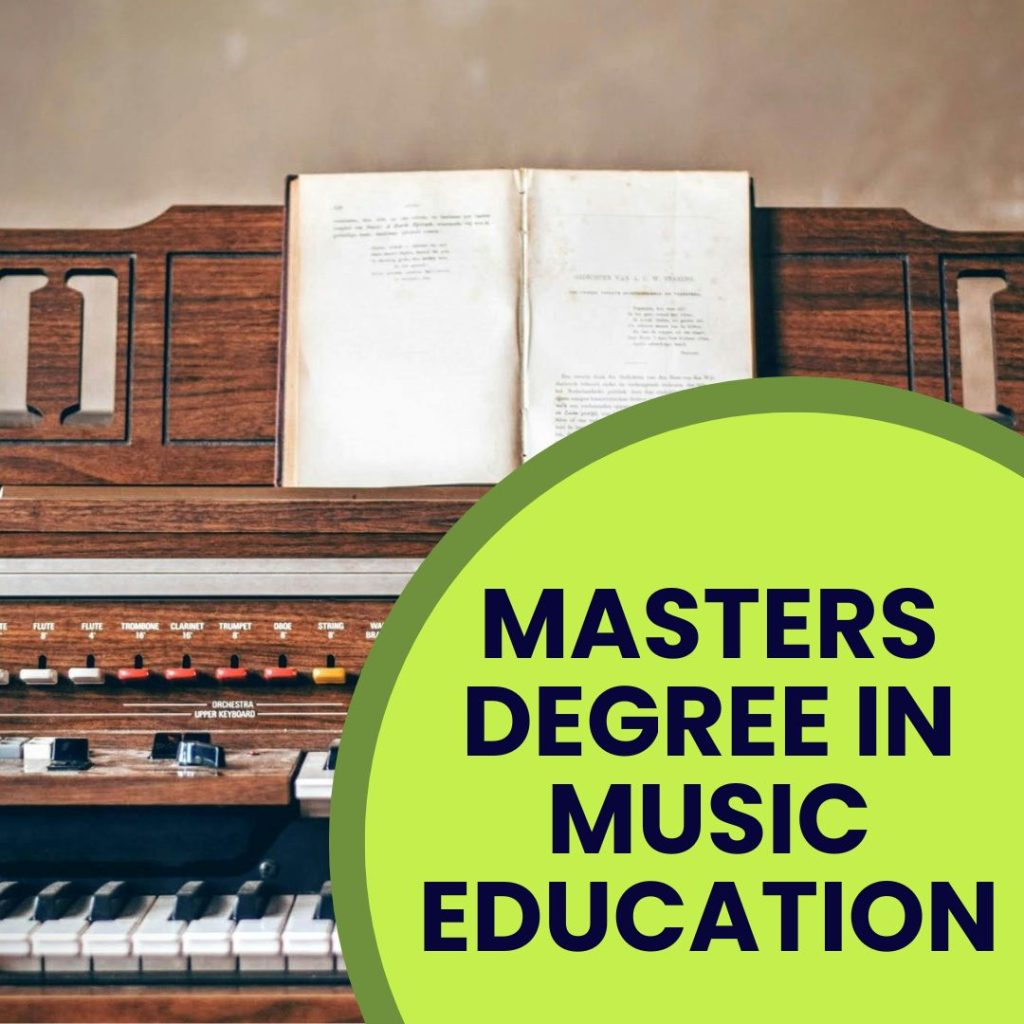
Pitching The Future
Pitching the Future is about envisioning the prospects of a Masters Degree in Music Education. This specialized advanced degree doesn’t just enhance knowledge. It opens doors to a symphony of opportunities. Explore the vibrant career landscape and the importance of perpetual skill development below.
Industry Outlook For Music Educators
A bright future awaits those passionate about teaching music. Jobs in this field are diverse and fulfilling. Explore the statistics and predictions that spotlight the demand for music educators:
- Schools are investing in arts programs, boosting demand for qualified music teachers.
- Private lessons are flourishing as individuals of all ages seek personalized instruction.
- Emerging technologies in music education create new teaching roles.
| Position | Expected Growth |
|---|---|
| Music Teacher, K-12 | 4% (2021-2031) |
| Music Director | 5% (2021-2031) |
| Private Tutor | Variable Growth |
Lifelong Learning And Continuous Professional Development
Learning never stops in the world of music education. Music educators must stay in tune with the latest teaching methods. Consider the benefits of ongoing professional development:
- Enhanced teaching strategies keep educators at the forefront of learning trends.
- Networking opportunities stem from workshops and conferences.
- Professional certifications can build upon a Master’s degree, opening more doors.
Continuous growth ensures music educators remain relevant and inspirational. Workshops, online courses, and peer collaboration contribute to this growth. Secure a fulfilling career through dedication to lifelong learning.
Frequently Asked Questions For Masters Degree In Music Education
What Is A Masters In Music Education?
A Masters in Music Education is an advanced degree. It focuses on teaching strategies, music theory, and educational psychology. Graduates can teach at various levels, from elementary to college.
How Long Does The Masters Program Take?
Typically, the program takes about 2 years to complete. However, part-time students may take longer to graduate.
What Are The Requirements For Enrollment?
Admission generally requires a bachelor’s degree in music or education. Many programs also expect a teaching license and professional experience.
Can I Study Online For A Music Education Degree?
Yes, many institutions offer online Masters in Music Education programs. They provide flexibility for working professionals to balance their studies with other commitments.
Conclusion
Embarking on a Master’s in Music Education paves the way for both personal and professional growth. It equips educators with advanced skills to inspire and nurture the next generation of musicians. This degree opens doors to higher career prospects and deeper musical engagement.
Those passionate about music and teaching will find it a rewarding investment in their future. Pursue excellence, impact lives, and foster the arts with this transformative educational journey.

